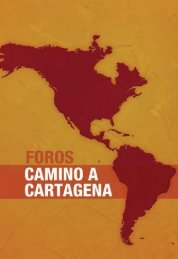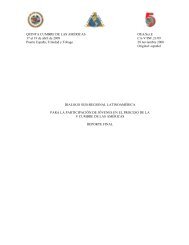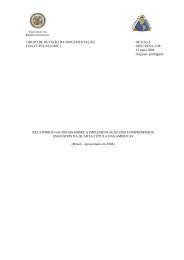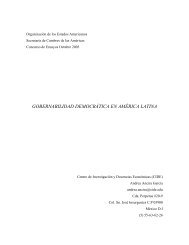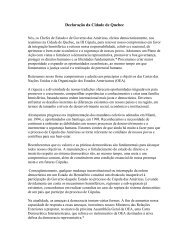The Road to Hemispheric Cooperation: Beyond the Cartagena
The Road to Hemispheric Cooperation: Beyond the Cartagena
The Road to Hemispheric Cooperation: Beyond the Cartagena
You also want an ePaper? Increase the reach of your titles
YUMPU automatically turns print PDFs into web optimized ePapers that Google loves.
Permanent Council <strong>to</strong> undertake a collective assessment<br />
of a situation that involves an unconstitutional alteration<br />
of <strong>the</strong> democratic order. One example is Nicaragua’s decision<br />
<strong>to</strong> allow <strong>the</strong> incumbent president <strong>to</strong> run for a third<br />
term in violation of <strong>the</strong> constitution.<br />
●● <strong>The</strong> demand of some states <strong>to</strong> permit <strong>the</strong> unconditional<br />
return of Cuba as a member of <strong>the</strong> OAS, despite it not<br />
meeting <strong>the</strong> democratic criteria of <strong>the</strong> OAS Charter and<br />
<strong>the</strong> IADC.<br />
●● <strong>The</strong> hostile actions by Brazil, Bolivia, Venezuela and<br />
Ecuador, among o<strong>the</strong>rs, <strong>to</strong> reject decisions of <strong>the</strong> Inter-<br />
American Court and <strong>the</strong> IACHR and <strong>to</strong> restrict its au<strong>to</strong>nomy<br />
and independence. Venezuela and Ecuador are even<br />
considering withdrawing from <strong>the</strong> IACHR.<br />
●● <strong>The</strong> unwillingness of countries such as Venezuela and<br />
Nicaragua <strong>to</strong> invite OAS observers <strong>to</strong> moni<strong>to</strong>r elections<br />
(though Nicaragua reluctantly—and belatedly—invited<br />
<strong>the</strong> OAS and <strong>the</strong> European Union <strong>to</strong> observe <strong>the</strong> latest<br />
presidential and legislative election).<br />
It is true that much progress has been made <strong>to</strong>ward free and<br />
fair elections in most of <strong>the</strong> region, thanks in part <strong>to</strong> OAS efforts<br />
<strong>to</strong> moni<strong>to</strong>r elections and provide technical assistance<br />
<strong>to</strong> elec<strong>to</strong>ral authorities. However, some incumbents twist<br />
elec<strong>to</strong>ral processes in <strong>the</strong>ir favor through manipulation of<br />
elec<strong>to</strong>ral laws and <strong>the</strong> constitution, use and abuse of state<br />
resources, and patronage, intimidation, media bias and interference<br />
in judicial processes. Although democratic consolidation<br />
continues in most countries in <strong>the</strong> region, some<br />
Latin American states are moving slowly away from bedrock<br />
principles of <strong>the</strong> IADC—such as <strong>the</strong> separation of powers,<br />
freedom of <strong>the</strong> press and respect for political pluralism.<br />
With regard <strong>to</strong> human rights, <strong>the</strong> growing demands of traditionally<br />
marginalized indigenous peoples <strong>to</strong> be consulted<br />
before governments take decisions that affect <strong>the</strong>ir wellbeing<br />
are proving highly contentious. Political persecution<br />
and attacks on <strong>the</strong> freedom of expression are on <strong>the</strong> rise<br />
in several countries. And <strong>the</strong> challenges of transnational<br />
organized crime and trafficking-related violence are generating<br />
pressure for hard-line approaches <strong>to</strong> public security,<br />
including an increasing reliance on <strong>the</strong> military in internal<br />
policing with an attendant spike in human rights violations.<br />
Taken <strong>to</strong>ge<strong>the</strong>r, <strong>the</strong>se trends suggest that <strong>the</strong> democracy<br />
and human rights agenda remains as relevant as ever <strong>to</strong><br />
inter-American stability and cooperation.<br />
<strong>The</strong> political context for addressing <strong>the</strong>se challenges, however,<br />
has turned particularly hostile in <strong>the</strong> recent past. A<br />
group of states, mostly under <strong>the</strong> banner of <strong>the</strong> Alianza Bolivariana<br />
para los Pueblos de Nuestra América (ALBA), is<br />
challenging <strong>the</strong> authority and legitimacy of <strong>the</strong> OAS as an<br />
institution, while promoting <strong>the</strong> creation of competing subregional<br />
organizations such as <strong>the</strong> Unión de Naciones Suramericanas<br />
(UNASUR) and Comunidad de Estados Latinoamericanos<br />
y del Caribe (CELAC), with scant attention paid<br />
<strong>to</strong> questions of democracy and human rights. Several Latin<br />
American and Caribbean countries are prepared <strong>to</strong> go <strong>the</strong>ir<br />
own way without <strong>the</strong> United States and Canada when it is<br />
convenient <strong>to</strong> do so, particularly on sensitive issues such as<br />
political reform or elec<strong>to</strong>ral observation. 2<br />
Within this framework, efforts <strong>to</strong> defend or streng<strong>the</strong>n <strong>the</strong><br />
inter-American system’s capacities <strong>to</strong> respond <strong>to</strong> erosions<br />
of democracy and <strong>the</strong> observance of human rights can fall<br />
victim <strong>to</strong> a propaganda battle between countries opposed <strong>to</strong><br />
any external interference in internal affairs and those seeking<br />
<strong>to</strong> uphold <strong>the</strong> core values of <strong>the</strong> inter-American system.<br />
This was most recently seen in <strong>the</strong> working group created<br />
“<strong>to</strong> streng<strong>the</strong>n <strong>the</strong> Inter-American Commission on Human<br />
Rights”—and <strong>the</strong> subsequent battle at <strong>the</strong> OAS General<br />
Assembly in June 2012—which has become bogged down<br />
in efforts by some states <strong>to</strong> actually weaken <strong>the</strong> independence<br />
of <strong>the</strong> body.<br />
Origin and Evolution of <strong>the</strong> Democratic Charter<br />
As <strong>the</strong> consensus on representative democracy and <strong>the</strong><br />
commitment <strong>to</strong> exercise and protect it appear <strong>to</strong> be declining<br />
in many Latin American states, it is time <strong>to</strong> consider<br />
how best <strong>to</strong> streng<strong>the</strong>n <strong>the</strong> IADC as <strong>the</strong> principal multilateral<br />
diplomatic instrument for <strong>the</strong> collective promotion and<br />
defense of democracy in <strong>the</strong> Western Hemisphere. <strong>The</strong><br />
IADC was adopted at <strong>the</strong> OAS General Assembly held in<br />
Lima, Peru, on September 11, 2001. 3<br />
<strong>The</strong> IADC is actually <strong>the</strong> culmination of a his<strong>to</strong>rical effort<br />
that gained traction in <strong>the</strong> early eighties, as <strong>the</strong> great majority<br />
of member states returned <strong>to</strong> democratic governance<br />
after long years of military rule, and was determined <strong>to</strong> consolidate<br />
and protect it collectively.<br />
<strong>The</strong> <strong>Road</strong> <strong>to</strong> <strong>Hemispheric</strong> <strong>Cooperation</strong>: <strong>Beyond</strong> <strong>the</strong> <strong>Cartagena</strong> Summit of <strong>the</strong> Americas<br />
<strong>The</strong> Brookings Institution ❘ Latin America Initiative<br />
78



